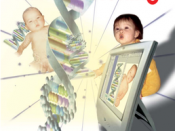By definition a "human clone" is a scientific replication of another person. A clone is not actually an exact replica of the original, but rather a younger identical twin. As with identical twins, the clone and the original person have different fingerprints. They are also likely to have different personalities. The technological benefits of genetic engineering outweigh societal consequences. Cloning will create a prosperous life for a better tomorrow because it has great potential to bolster our horizon.
Genetic engineering and cloning have played important roles in agriculture for many generations. Bananas and seedless grapes, for example, are, quite literally, living genetic clones. Prior to the last decade of the 20th Century, human cloning was purely a subject of science fiction, but by the dawn of the 21st Century, researchers had already cloned several mammals successfully. In 1997, Scottish scientists at Roslin Institute successfully cloned the sheep "Dolly", and began the debate over the ethical and moral principles surrounding the technology of cloning.
Most scientists recognize this process as the duplication of biological material. In the case of "Dolly", the scientists used the nuclei of various types of sheep cells, and implanted them into an unfertilized egg. The eggs were then planted into a live sheep, and successfully delivered through natural birth. The result was an exact genetic copy of the sheep that produced the original nuclei.
Sometimes people often question whether or not we as a scientific nation are trying to play the role of God. I feel that we are not trying to play God, merely help to improve the lives of his people. Many people say that we should not try to interfere with nature. If we try to clone organs for transplant patients that are in their final hour then we are actually improving...



Thoughts and Comments
i truly believe that this essay excels in so many areas that is educational and boggles the minds and hearts of ppl throughtout the world.
0 out of 0 people found this comment useful.